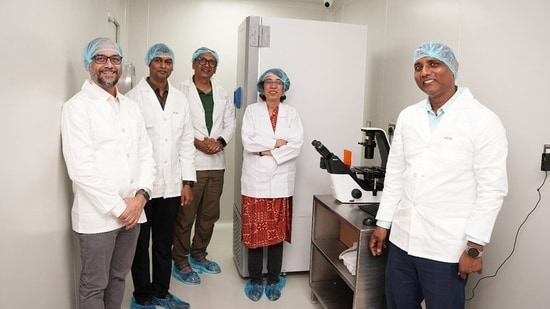Our Terms & Conditions | Our Privacy Policy
IIT Delhi unveils pioneering BSL3 research facility to transform healthcare innovation
The Indian Institute of Technology Delhi (IIT Delhi) has inaugurated a state-of-the-art Biosafety Level 3 (BSL3) research facility to advance biomedical and clinical diagnostics research. The facility is part of the institute’s Central Research Facility (CRF) and will support studies on diagnostic devices and therapeutics involving class-3 pathogens.
The newly launched research facility is located within the Micromodel Complex on the campus under the umbrella of the IIT Delhi’s Central Research Facility (CRF)
Located inside the campus, the facility is the first of its kind among leading educational institutions in India. It will be accessible to researchers, startups, and industries on a paid, assisted basis, promoting collaborations with medical institutes in the National Capital Region (NCR) and across India.
“This facility will bring scientists and engineers together to drive innovation in medical diagnostics and therapeutics,” said Prof. Arvind Nema, Deputy Director (Operations), IIT Delhi. “It brings scientists and engineers together on a single platform and opens new avenues for collaborations with medical institutes across the country.”
A Major Boost for Startups and MSMEs
The BSL3 facility is expected to significantly benefit startups and MSMEs by providing them access to advanced infrastructure without requiring heavy investments. Device developers can now bring their hardware and personnel into the facility to conduct real-time testing and iterative development under the supervision of trained professionals, as per a press note issued by the institute informing about the launch of the facility.
“For the first time in India, users will be able to test their medical devices inside a BSL3 facility under expert guidance,” said Prof. Sandeep K. Jha. “This hands-on access will allow engineers to debug and optimise their diagnostic platforms more efficiently.”
Prof. Ashok K. Patel, who co-led the initiative, highlighted that this facility addresses a major gap:
“Earlier, developers had to send devices to specialised BSL3 or BSL4 labs for testing, which slowed down improvements. With this setup, iterative testing becomes quicker and more streamlined.”
Strengthening India’s Healthcare Research Ecosystem
By integrating engineers, biologists, and medical researchers, the facility positions IIT Delhi as a hub for healthcare innovation. It is expected to accelerate the development of advanced diagnostic tools and therapeutics, strengthening India’s capabilities in tackling infectious diseases and improving public health outcomes.
Images are for reference only.Images and contents gathered automatic from google or 3rd party sources.All rights on the images and contents are with their legal original owners.



Comments are closed.